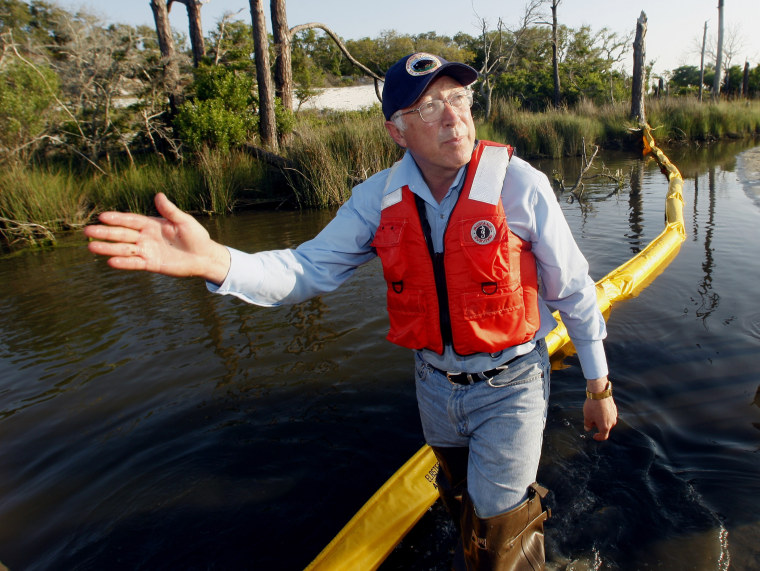The Obama administration on Tuesday said it will split up an Interior Department agency that oversees offshore drilling as part of its response to the Gulf Coast oil spill.
“The job of ensuring energy companies are following the law and protecting the safety of their workers and the environment is a big one, and should be independent from other missions of the agency,” Interior Secretary Ken Salazar said in a statement.
The move will split the Minerals Management Service in two. One group will be charged with inspecting oil rigs, investigating oil companies and enforcing safety regulations, while the other will oversee leases for drilling and collection of billions of dollars in royalties.
The Minerals Management Service, an arm of the Interior Department, oversees the nation's natural gas, oil and other mineral resources. The agency collects and distributes more than $13 billion per year in revenues from federal leases for offshore and onshore drilling. It also enforces laws and regulations that apply to drilling operations.
There is no timeline for when this will happen, but a department spokesman said it would likely take place after the government's investigation of the rig accident is over.
As part of the MMS overhaul, the White House will ask Congress for an additional $29 million to pay for more inspections of offshore platforms and for a thorough review of procedures. The agency's current inspection budget is $23 million.
Salazar said the administration will also ask Congress to extend the time limit the MMS has to decide on oil and gas exploration plans submitted by energy companies to 90 days from 30 days. This would allow more time for the agency to conduct environmental analysis on an exploration plan.
Some critics have said the two roles within MMS are in conflict and are one reason the agency has long been accused of being too cozy with the oil and natural gas industry. There is growing bipartisan sentiment in Congress in favor of toughening oversight of MMS. At a minimum, lawmakers want to ensure that the agency's director is a Senate-confirmed position.
The current director, Elizabeth Birnbaum, was appointed by President Barack Obama but did not require Senate confirmation.
'Ethical failure' found in 2008
An internal investigation in 2008 described a "culture of substance abuse and promiscuity" by workers at the minerals agency. The investigation by Interior's inspector general found workers at the MMS royalty collection office in Denver partied, had sex with and used drugs with energy company representatives. Workers also accepted gifts, ski trips and golf outings, the report by Inspector General Earl E. Devaney said.
Devaney decried "a culture of ethical failure" and an agency rife with conflicts of interest.
More than half a dozen workers out of around 50 at the Denver office were disciplined — and several were fired — because of the scandal.
Salazar, who promised aggressive reform when he took over the Interior Department early last year, believes the tragedy aboard the Deepwater Horizon oil rig — and the resulting massive oil spill — has made reform even more urgent, an administration official said.
The Interior Department will move to establish an independent energy inspection agency within the Minerals Management Service "so that the American people know that they have a strong and independent organization holding energy companies accountable and in compliance with the law of the land," the official said.
At Obama's request, Salazar is conducting a 30-day review of offshore drilling. He also has appointed an Outer Continental Shelf Safety Oversight Board to recommend management improvements and closer oversight of offshore drilling operations.
Inquiry under way
The MMS and U.S. Coast Guard are conducting a joint investigation of the April 20 explosion on the Deepwater Horizon rig and will file a report to Obama. The six-member panel began two days of hearings Tuesday in Louisiana, the same day Congress begins a series of hearings on the oil rig explosion and oil spill.
Since taking office in January 2009, Salazar has pushed a series of reforms at MMS, including establishment of new ethics standards, termination of a controversial royalty-in-kind program, and increased emphasis on wind and other renewable energy sources.
He also has canceled proposed offshore lease sales in Alaska and the Arctic Ocean and established what he calls a science-based process for determining where offshore drilling is appropriate on the Outer Continental Shelf.
Last week, the Interior Department said it is indefinitely suspending public hearings on the proposed sale of oil and gas leases off the Virginia coast while it focuses on the Gulf oil spill. The department said MMS staff had focused their attention on the Gulf incident and would be unable to conduct the meetings until a later date.
On March 31, three weeks before the Gulf explosion, Obama called for new offshore drilling in the Atlantic Ocean from Delaware to central Florida, plus the northern waters of Alaska. He also said he wants Congress to lift a drilling ban in the oil-rich eastern Gulf of Mexico, 125 miles from Florida beaches.
After the oil spill, Obama promised that no new offshore oil drilling leases will be issued unless rigs have new safeguards to prevent a repeat of the explosion. He ordered Salazar to report on what new technologies are needed to tighten safeguards against oil spills from deep water drilling rigs.
Sen. Bill Nelson, D-Fla., a longtime opponent of expanding offshore drilling, has written to Interior's inspector general demanding an investigation of whether the oil and gas industry influenced an MMS decision not to require remote-control shutoff switches on drilling rigs.
The remote-control devices are mandatory in Norway and Brazil as a backup to the standard emergency shut-off valves. Drilling safety advocates say such equipment might have stemmed the flow of oil from the well drilled by the Deepwater Horizon rig operated by BP.
